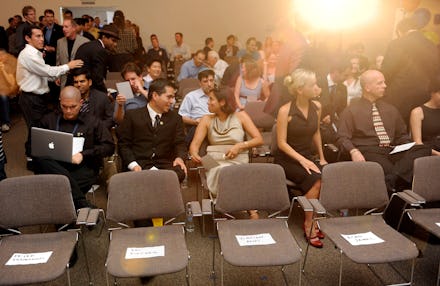Why Silicon Valley's "Self-Made" Millionaires are Really "Government-Made" Millionaires

Silicon Valley is quickly becoming a new political battleground. While generally liberal, there's a libertarian streak that runs through the valley that has Republicans salivating. In an effort to woo this crowd of "self-made millionaires" and take control of the Senate in this year's midterm elections, they've been talking the language of innovation and individualism.
One issue though, is there aren't any self-made millionaires in Silicon Valley. It's one of our great, enduring myths.
Michael Arrington, the outspoken founder of TechCrunch, wrote an editorial in 2010 that went viral among Silicon Valley's finance community. The article was a screed against government "mucking around" in the private sector and Arrington warned that politicians would "devastate Silicon Valley's delicate venture capital ecosystem" by instituting financial reform.
Arrington's commentary was quickly forgotten, but its echoes still resound in recent examples of Silicon Valley entrepreneurs envisioning "opt-in societies" free of government meddling or splitting California into six separate states.
Image Credit: Bay Area News Group
Arrington's words resonate with many assorted millionaires, billionaires and utopian Libertarians, but reality begs to differ. Silicon Valley owes its success to government money, including infrastructure, research grants, startup loans and other forms of sustained public investment.
For example, Google is perceived to be the product of two entrepreneurial geniuses, when in fact the $290 billion monolith owes its existence to a $4.5 million digital libraries research grant from the National Science Foundation, an organization nearly gutted by House Republicans last year.
Inventions often attributed to Apple — including the mouse, graphical user interface, touchscreen and even voice recognition software such as Siri — were developed with immense federal investment.
Microsoft founder Bill Gates even wrote a foreword to a controversial book entitled The Self-Made Myth: And the Truth about How Government Helps Individuals and Businesses Succeed. Even one of the richest men in the world agrees that "we the people" are the chief incubator of Silicon Valley's success, not the venture capitalists who seek to profit from it.
Image Credit: AP
It is widely believed that Silicon Valley mainly consisted of apricot orchards and quiet suburbs prior to the tech boom, but the vast majority of its existing high-tech infrastructure is actually a remnant of the area's history as one of the defense industry's biggest research installations.
In fact, Santa Clara County, which encompasses part of Silicon Valley, had the highest per-worker number of defense contract dollars of any U.S. county in 1992. Stanford professor and entrepreneur Steve Blank runs an excellent website devoted to uncovering the "secret history of Silicon Valley," a region fueled for decades by government-funded weapons research and electronic intelligence, where Lockheed Martin is currently the area's third largest for-profit employer. The public sector has been active in research and development endeavors in the South Bay for nearly a century.
Despite the facts, many will continue to insist that Silicon Valley success stories are individual tales of inventiveness, cunning and business savvy. This is partly true, but its supporters need to recognize the public sector's place in technological innovation. The myth of the "self-made Silicon Valley entrepreneur" has deep connections to the centuries-old value of American ingenuity. Public investment is a manifestation of this ingenuity, not a hindrance.
The fact that government facilitated this progress is not an attack on the brilliance of Silicon Valley's greatest minds, it is a reminder of how much we can accomplish when we work together and invest in each other.
After all, Silicon Valley's gadgets — even the personal computer — are ultimately trivial compared to the groundbreaking technological developments funded by government in the last few decades. How effective is a personal computer with no Internet? Why have a cellphone without cellular technology? What good is Google Maps without a GPS system and satellite equipment?
Silicon Valley is great at improving and streamlining various taxpayer-funded innovations. It's ironic to see "self-made entrepreneurs" like Arrington alleging that government hasn't created anything of value when Silicon Valley is essentially a government-funded startup.
Biting the hand that feeds? I can't think of a better example.